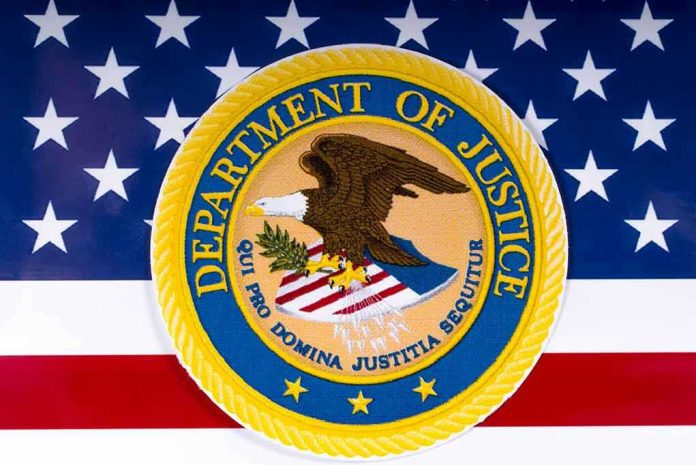
The Justice Department is standing firm in its defense of Alina Habba’s contentious appointment, setting the stage for a legal showdown that could redefine executive authority.
At a Glance
- The DOJ defends Alina Habba’s appointment as U.S. Attorney for New Jersey despite Senate inaction.
- Defendants in criminal cases challenge her authority, causing trial delays.
- The case tests the balance of power between the executive and legislative branches.
- The outcome could affect future federal prosecutor appointments.
DOJ Defends Habba’s Appointment
The Department of Justice has come out swinging in defense of Alina Habba’s appointment as Acting U.S. Attorney for the District of New Jersey. This defense comes against the backdrop of challenges from defendants in criminal cases questioning the validity of her role due to the Senate’s failure to confirm her. The DOJ maintains that Habba’s authority is legitimate, citing her designation as a Special Attorney to the Attorney General and the subsequent delegation of prosecutorial powers. The DOJ is urging the courts to dismiss these challenges swiftly to prevent disruptions in ongoing prosecutions.
[Paul Cassell] The Justice Department Powerfully Defends Alina Habba's Appointment as Acting U.S. Attorney for New Jersey https://t.co/PcebQX7hJ8
— Volokh Conspiracy (@VolokhC) July 29, 2025
The stakes are high, not just for Habba but for the broader legal framework surrounding executive appointments. If the courts side with the DOJ, it could set a precedent reinforcing the President’s ability to appoint acting officials without Senate confirmation, at least in the short term. However, this legal battle has prompted significant delays in federal prosecutions in New Jersey, affecting both defendants and victims awaiting justice.
The Political and Legal Context
This legal saga unfolds in a climate charged with political tension and debate over the separation of powers. President Trump’s administration, having appointed Habba, is asserting its executive authority against what it perceives as legislative obstruction. The Senate’s inaction on Habba’s confirmation has left a legal gray area that defendants are now exploiting to challenge the legitimacy of ongoing prosecutions. This isn’t just a legal skirmish but a clash of governmental powers, with the courts caught in the middle.
The U.S. District Judge Matthew Brann is presiding over this high-profile case. His ruling could have far-reaching implications, potentially influencing how future acting U.S. Attorneys are appointed and challenged. This case also underscores the political dynamics at play, with the Senate’s role—or lack thereof—central to the controversy.
Implications for Justice and Governance
The immediate consequence of this legal challenge is a halt in several criminal trials in New Jersey. For the defendants, this is a strategic move to question the legitimacy of prosecutions under Habba’s supervision. For victims and law enforcement agencies, it’s an unwelcome delay in the pursuit of justice. The broader implications, however, are even more significant. If the courts uphold Habba’s appointment, it could embolden future administrations to bypass Senate confirmation for key roles, citing similar justifications.
This could lead to a reevaluation of how prosecutorial authority is delegated and the role of Senate oversight. On the flip side, if the courts rule against the DOJ, it might reinforce the necessity of Senate confirmation to uphold the integrity and legitimacy of federal appointments. Either outcome will likely prompt discussions on potential legislative reforms to address ambiguities in the appointment process.
Broader Political Ramifications
This case is more than just a legal challenge; it’s a litmus test for the balance of power between the executive and legislative branches. The outcome could have lasting political ramifications for President Trump’s administration and future executive-legislative relations. A ruling in favor of the DOJ might strengthen the executive branch’s hand in similar disputes, while a ruling against it could underscore the importance of legislative oversight.
The case has attracted significant attention from legal scholars, political analysts, and the public, all watching closely to see how this plays out. The implications extend beyond New Jersey, potentially influencing federal appointment practices nationwide. As the nation waits for Judge Brann’s decision, the tension between maintaining prosecutorial continuity and adhering to procedural norms remains at the forefront of the debate.



